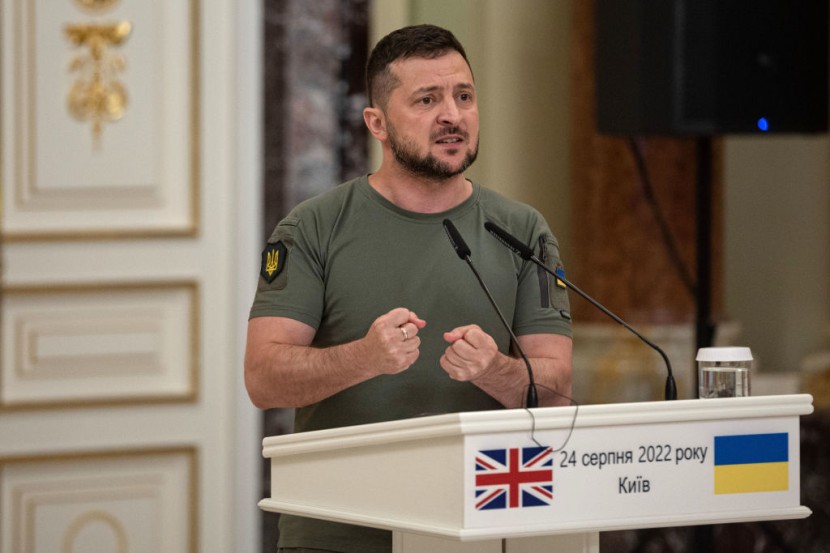
Stating that Russia was seeking a "short truce" with Ukraine, President Volodymyr Zelenskyy vehemently opposed the idea since it would just allow Moscow's soldiers to reassemble.
His remarks, made in a prepared video on Friday to open the Halifax International Security Forum in 2022, revealed a leader who was hesitant to put an end to the conflict and who had no interest in early peace negotiations.
Russia-Ukraine War
Zelensky said that "the full deconstruction of Russian aggression" is the only way to bring about an "honest peace" and that "immoral compromises would only result in additional blood."
It is unknown how formally, if at all, Moscow offered the truce request. Similar claims, made by Zelenskyy, that any attempt to end the war would be more advantageous to Russia than Ukraine, have been made in the past. Having just compelled Russian soldiers to leave the southern city of Kherson, Ukrainian forces presently control the war's momentum.
Zelenskyy's remarks, however, were made in a different context this time around as US officials prod their Ukrainian colleagues to defuse the situation and take steps that could result in a peaceful settlement to the conflict. He made it clear to the leaders and experts of the democracies across the world-many of whom support Ukraine-that there could be no peace in Russia's conditions.
Zelenskyy's comments were more blunt and forthright, suggesting that Moscow may have directly appealed to Kyiv as pressure to find a peaceful resolution to the war grows. The head of the Joint Chiefs, Gen. Mark Milley, has previously suggested that a lull in hostilities over the winter would open doors for diplomacy.
The State Department and National Security Council spokespeople did not immediately respond to requests for comment. An inquiry sent by email to the Russian Embassy in Washington similarly did not receive a prompt response, as per Politico. The conference in Halifax, a significant yearly event that brings together important leaders from democratic nations and campaigners seeking a democratic future for their countries, was nevertheless set off by Zelenskyy's uncompromising speech.
This year's meeting is centered on Russia's invasion of Ukraine and its consequences, and conference materials and accouterments are decorated in the yellow and blue of Ukraine. Today, Russia launched one of its heaviest missile barrages ever at Ukraine, putting the nation's energy infrastructure in "critical" condition and causing rolling blackouts.
According to the Ukrainian air force, more than 100 rockets were fired at cities around the nation, striking homes and power plants. Half of Kyiv, where at least one civilian died, and the whole city of Zhytomyr were left without electricity as a result of the bombing.
US Declines to Pressure Zelensky
The situation in Kharkiv, Vinnytsia, Rivne, Odesa, Zaporizhzhia, Chernihiv, Khmelnytskyi, and Ivano-Frankivsk was less clear, although strikes were also reported there. Lviv, which was stated to be under a partial blackout, was also attacked, Daily Mail reported.
It happened only hours after Ukrainian President Volodymyr Zelensky, speaking to world leaders at the G20 meeting in Bali via videolink from Kyiv, said he is willing to put an end to the conflict as long as Russia withdraws its forces from territories it presently controls.
Speaking later at the summit in Indonesia, Sergei Lavrov, the foreign minister of Russia, accused Kyiv of "prolonging" the conflict and the West of conducting a "hybrid war" in Ukraine without addressing Russia's own participation in the combat.
Meanwhile, the White House denied pressuring Kyiv to negotiate, saying on Friday that only Ukrainian President Volodymyr Zelensky may decide to begin peace negotiations with Russia. Two days prior, Joint Chiefs Chairman Mark Milley, the senior general at the Pentagon, had said that Kiev would be able to take advantage of its huge military wins and the significant reduction in Russian troop strength in order to start peace negotiations.
According to Milley, it is improbable that Ukrainian forces would soon be able to retake all of the territories that Russia has captured, particularly Crimea, which Moscow annexed in 2014. Kirby underscored, however, that no pressure existed and that the US was not acting alone, as per Live Mint.
Related Article : Russia-Ukraine War: Moscow's Drones Keeps Attacking Ukraine Power Grid as Putin Remains Silent on Mounting Setbacks
@YouTube








